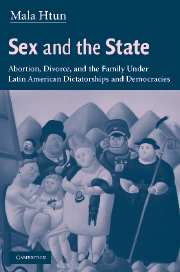 Sex and the State
Sex and the State Book contents
- Frontmatter
- Contents
- Acknowledgments
- Note on Translations
- 1 Sex and the State in Latin America
- 2 Four Normative Traditions
- 3 Reforming Women's Rights Under Military Dictatorships
- 4 Church and State in the Struggle for Divorce
- 5 Completing the Agenda: Family Equality and Democratic Politics
- 6 Why Hasn't Abortion Been Decriminalized in Latin America?
- 7 Conclusion
- References
- Index
5 - Completing the Agenda: Family Equality and Democratic Politics
Published online by Cambridge University Press: 08 January 2010
- Frontmatter
- Contents
- Acknowledgments
- Note on Translations
- 1 Sex and the State in Latin America
- 2 Four Normative Traditions
- 3 Reforming Women's Rights Under Military Dictatorships
- 4 Church and State in the Struggle for Divorce
- 5 Completing the Agenda: Family Equality and Democratic Politics
- 6 Why Hasn't Abortion Been Decriminalized in Latin America?
- 7 Conclusion
- References
- Index
Summary
In the 1980s and early 1990s, civilian governments in Argentina, Brazil, and Chile assumed power and pledged to consolidate democracy in state and society. At the time, all three countries had laws on the books that granted fathers full parental rights over children, denying mothers the ability to make decisions about their children's welfare. Chilean law invested men with rights to administer common marital property, and Brazilian law still recognized the husband as the head of the household. Motivated by egalitarian ideals, changes in other countries, and feminist principles, networks of activists mobilized in all three countries to demand legal reform. Their successes varied. Argentina's civil law was reformed to grant women equal parental rights and erase distinctions between legitimate and illegitimate children. Brazil's new democratic Constitution advanced women's rights, but discrimination in the civil code continued through 2001. In Chile, conservative opposition delayed and derailed the government's plans to promulgate legal reforms to expand women's parental and property rights.
Why were family equality reforms advanced in some countries but delayed and prevented in others? The transition to democracy permitted issue networks of feminists, lawyers, and sympathetic government officials advocating family equality to organize and advance proposals for change. Like their predecessors who worked to expand women's rights under military dictatorships, these “specialized subcultures of highly knowledgeable policy watchers” (Heclo 1978) were inspired by international agreements and changes in other countries.
- Type
- Chapter
- Information
- Sex and the StateAbortion, Divorce, and the Family under Latin American Dictatorships and Democracies, pp. 113 - 141Publisher: Cambridge University PressPrint publication year: 2003
